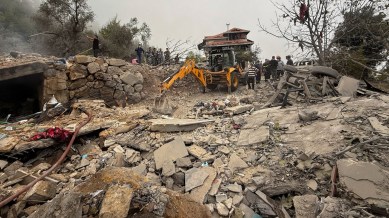Stay updated with the latest - Click here to follow us on Instagram
Israel military operations against Hezbollah expand to targeting northern Lebanon, kill 18
In addition to the airstrikes, Israel has issued evacuation orders for residents in 25 villages located south of the Awali River

Israel has expanded its airstrike operations against the Iran-backed Hezbollah militia in Lebanon, resulting in at least 18 fatalities in the Christian-majority town of Aitou. The Lebanese Red Cross reported that the airstrike, which occurred on Monday, hit a house rented by displaced families, leading to the deaths of multiple civilians and injuring four others.
This latest strike marks a departure from Israel’s previous focus on southern Lebanon, the Bekaa Valley, and the suburbs of Beirut. Aitou’s mayor, Joseph Trad, confirmed the tragic impact of the airstrike on the local community.
monthly limit of free stories.
with an Express account.
In addition to the airstrikes, Israel has issued evacuation orders for residents in 25 villages located south of the Awali River, which flows approximately 60 kilometers north of the Israeli border. This move is part of Israel’s broader strategy to mitigate risks as it intensifies its military actions in the region.
The Israeli military also announced the elimination of Muhammad Kamel Naim, commander of Hezbollah’s anti-tank missile unit, during a strike in the Nabatieh area of southern Lebanon. Hezbollah has yet to comment on this development, which underscores the ongoing volatility of the situation.
These military operations come amid rising tensions between Israel and the United Nations peacekeeping force, UNIFIL, operating in southern Lebanon. Israeli Energy Minister Eli Cohen reiterated calls from Prime Minister Benjamin Netanyahu for UN troops to withdraw, citing concerns over the effectiveness of UNIFIL in the region.
The relationship between Israel and the United Nations has become increasingly strained, with both parties trading accusations. The U.N. reported that Israeli tanks entered their base on Sunday, marking another instance of alleged violations against peacekeeping forces. Israel has disputed the U.N.’s account, with Netanyahu accusing UNIFIL of providing “human shields” for Hezbollah—an allegation that Hezbollah has denied.
Meanwhile, regional tensions continue to escalate as the Middle East remains on high alert for potential Israeli retaliation against Iran, following an October 1 missile barrage launched in response to Israeli operations in Lebanon. The Pentagon announced over the weekend that U.S. troops would be deployed to Israel, along with an advanced anti-missile system to bolster defenses.
In Lebanon, the U.S. embassy has strongly urged American citizens to leave the country “now,” warning that flights arranged for evacuation since September 27 would not be available indefinitely.
On Sunday, the Israeli military also provided foreign journalists with a tour of southern Lebanon, showcasing a Hezbollah tunnel shaft located just 200 meters from a UNIFIL position, along with other weapons caches discovered in the area. Brigadier General Yiftach Norkin highlighted the proximity of these tunnels to UN positions, further complicating the security landscape.
Since the start of its ground operations near the border, the Israeli military claims to have destroyed dozens of Hezbollah tunnel shafts, rocket launchers, and command posts. Hezbollah’s extensive tunnel network in southern Lebanon is estimated to span hundreds of kilometers, a critical component of their military strategy. A Hezbollah field commander described the tunnels as “the foundation of the battle” in recent statements.
UNIFIL has expressed concerns that previous Israeli attacks have limited its ability to monitor the situation effectively, raising fears that violations of international law may go undetected as the conflict unfolds.
European Union foreign policy chief Josep Borrell criticized the delay in EU member states condemning Israel’s attacks on UNIFIL soldiers, calling the actions “completely unacceptable.” Spanish Prime Minister Pedro Sanchez has urged EU members to respond to requests to suspend the bloc’s free trade agreement with Israel in light of its military operations in Lebanon and Gaza.
The conflict between Israel and Hezbollah has intensified over the past year, particularly since Hezbollah began launching rockets at Israeli positions in support of Hamas during the outbreak of the Gaza war. Israel asserts that its military operations in Lebanon are aimed at ensuring the return of tens of thousands of displaced individuals from northern Israel.